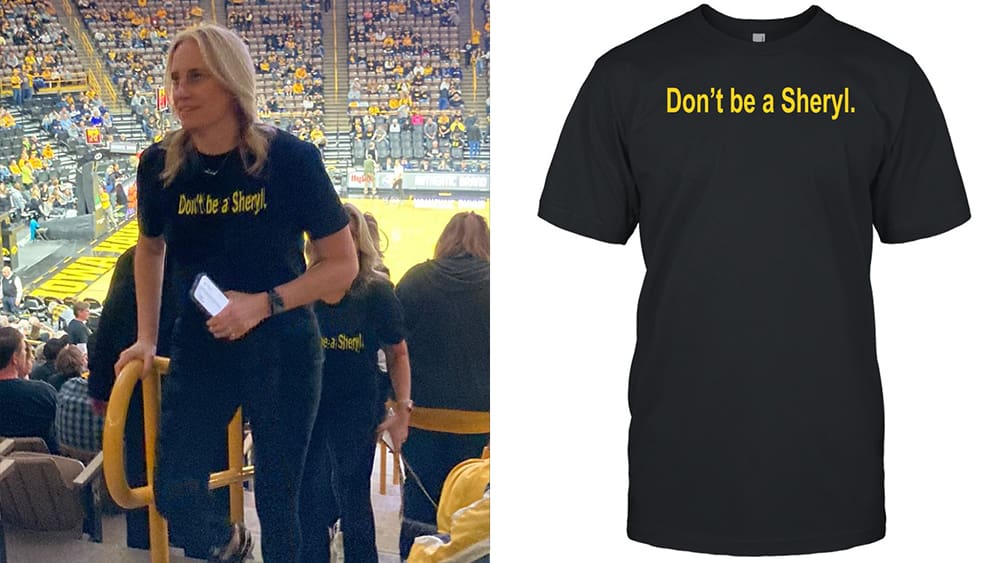News
Iowa Hawkeye Don’t Be A Sheryl Shirt – Iowa Fans Rally Behind Caitlin Clark Against Sheryl Swoopes Criticism
Basketball Hall of Famer Sheryl Swoopes recently took aim at Iowa basketball sensation Caitlin Clark, sparking a passionate response from Hawkeyes fans. Swoopes’ comments not only questioned Clark’s future prospects but also veered into inaccuracies about her collegiate career. In solidarity with their beloved player, Iowa supporters quickly mobilized, creating t-shirts emblazoned with the defiant slogan, “Don’t be a Sheryl.” This clash between a legend of the game and a rising star has ignited broader discussions about race, media representation, and the dynamics of fandom in today’s sports landscape.
Swoopes vs. Clark: A Clash of Legends and Rising Stars
Swoopes’ critique of Clark’s game wasn’t merely a difference of opinion; it was a misinformed attack that failed to acknowledge Clark’s undeniable talent and impact on collegiate basketball. By questioning Clark’s ability to transition to the professional level and wrongly citing her years in college, Swoopes not only underestimated the Hawkeyes’ standout but also overlooked the challenges faced by student-athletes during the pandemic. Clark’s supporters, including WNBA star A’ja Wilson, were quick to defend her against Swoopes’ unfounded assertions, highlighting the solidarity within the basketball community in championing young talent against unwarranted criticism.
Waittt they talking about …Sheryl as in Sheryl Swoopes ??? 😳 oh yall trippin https://t.co/834EQgwngM pic.twitter.com/dcJDiZYQft
— A'ja Wilson (@_ajawilson22) February 9, 2024
Despite Swoopes’ legendary status, her remarks reflect a broader trend in sports media where established figures sometimes overlook the achievements of rising stars, particularly women athletes. Clark’s rise to prominence has been accompanied by discussions about race and representation in sports, with commentators like Skip Bayless and right-wing media pundits adding fuel to the fire. Yet, through it all, Iowa fans have remained steadfast in their support for Clark, sending a powerful message about the importance of uplifting and celebrating emerging talents in the face of skepticism and bias.
Unpacking the “Don’t Be a Sheryl” Phenomenon: Race, Fandom, and Cultural Commentary
The emergence of the “Don’t be a Sheryl” t-shirts underscores deeper layers of meaning beyond the immediate defense of Caitlin Clark. The phrase evokes comparisons to the stereotype of a “Karen,” a term often associated with entitled and confrontational white women. In a predominantly white community like Iowa City, the racial undertones of the slogan cannot be ignored, raising questions about the intersection of race, fandom, and social commentary in sports culture. While it’s unclear whether Swoopes intended to reignite these tensions or if Iowa fans consciously embraced the racialized aspects of the debate, the conversation surrounding Clark’s legacy has inevitably touched on broader societal issues.
Don’t be a Sheryl. pic.twitter.com/iVXkuxJa5P
— 🐤 Hawkeye Hunz (@HawkeyeHunz) February 9, 2024
As discussions about Caitlin Clark’s record-breaking achievements continue to unfold, it’s crucial to recognize the complexities embedded within the sports narrative. Beyond the statistics and accolades, her journey reflects larger conversations about representation, power dynamics, and the evolving landscape of women’s athletics. Whether it’s challenging outdated narratives or standing up against racialized criticisms, the solidarity exhibited by Iowa fans sends a powerful message about the importance of amplifying diverse voices and dismantling barriers within the sports world and beyond. As we navigate these contentious waters, let’s remember that every player, regardless of race or background, deserves to be judged on their merit and celebrated for their contributions to the game.
You can buy Don’t Be A Sheryl Shirt to support Caitlin Clark below




